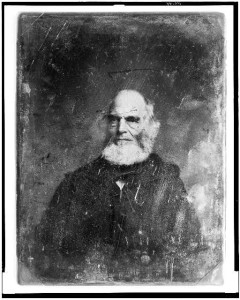It certainly wasn’t a novelty for New York City’s Cooper Institute to host an abolitionist presentation, but 150 years ago this week the speaker was Anna Elizabeth Dickinson, the first woman to speak before the U.S. Congress. It looks like it’s possible that her speech in Gotham was the same one she gave at the Capitol. For some reason the press was asked not to report the address verbatim. She urged abolition and recruits for the Union army. William Cullen Bryant compared Miss Dickinson to Miriam rejoicing in the deliverance at the Red Sea.
From The New-York Times February 3, 1864:
Lecture by Miss Anna Dickenson.
A crowded audience assembled at the Cooper Institute last evening to listen to the lecture of Miss ANNA E. DICKENSON on the ” Lessons of the Hour,” the same lecture as was delivered in Washington a short time since. The doors were opened at seven o’clock, and a continuous crowd poured into the hall, so that it was nearly filled in a quarter of an hour, and before half-past seven there was no possibility of obtaining an entrance, so that very many who had purchased tickets previously, both to reserved and other s eats, were compelled to leave, causing much dissatisfaction.
OLIVER JOHNSON, shortly before eight o’clock, stepped to the front of the platform, and said he had a word to say in regard to the management of the lecture. There had been a great crowd here, which was not at all anticipated. He had reason to believe, though he did not know absolutely, that the tickets had been counterfeited. He could only say that he had conscientiously counted the seats in this hall, and if more tickets had been sold than the number of seats, it had been owing to a mistake. Any person possessing tickets who had been unable to gain admission, could have the money refunded by calling at the Anti-Slavery office, No. 48 Beekman-street. Mr. JOHNSON further announced that WENDELL PHILLIPS would speak on “Reconstruction” at the Cooper Institute, two weeks from last (Tuesday) night, and THEODORE TILTON would speak at the Church of the Puritans this (Wednesday) evening.
WM. CULLEN B[R]YANT was then nominated as Chairman. He made a few eloquent remarks, closing by saying that, when the Hebrews stood on the opposite shore of the Red Sea, we read that the prophetess of the tribes, the sister of Aaron, poured forth in the presence of the people, an anthem of the Great Deliverer to nations. “He hath triumphed gloriously. The horse and the rider are thrown into the sea!” That was her word for the hour. And now, when the vast multitude have passed over the Red Sea to their freedom, pursued by a mighty host — their masters — we beheld the rod stretched over the waters; we beheld this mighty host pale with affright at the noise and rush of the returning waters which are beginning to inclose them, and it is my office (said the speaker) to present to you to-night a speaker who has her word for the hour. He then introduced Miss DICKINSON to the audience.
Mr. JOHNSON requested that no report would be taken of the lecture by the press.
Miss DICKENSON was simply and neatly dressed in black. She came forward with merely a small slip of paper in her hand with the head-notes of her lecture upon it, and referred to it, very seldom. The lecture was nearly the same as that delivered in Washington. At the end of a remark asserting for the utter removal of Slavery, she said: “You can afford to cheer that, for Mr. LINCOLN cheered it at Washington,” a remark which called out great laughter. The last portion of her lecture was made up to a great extent, of allegorical comparisons and illustrations from incidents in the war and in history, in favor of her. In her appeal to young men to enlist, she recited the story of the Roman youth who saved Rome by leaping into the yawning chasm. Miss DICKENSON retired amid applause.

![Anna Elizabeth Dickinson, social reformer, head-and-shoulders portrait, facing left (Philadelphia : J.W. Hurn, [ca. 1861]; LOC: LC-USZ62-73371)](https://www.bluegrayreview.com/wp-content/uploads/2014/02/3b20702r-195x300.jpg)
